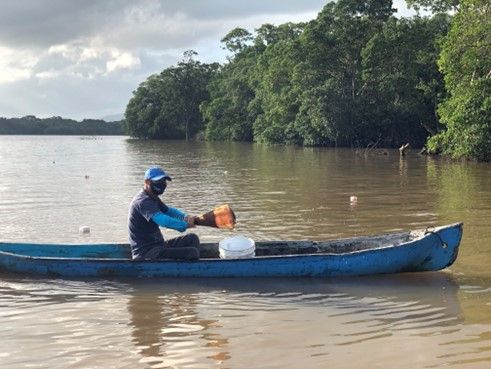 Stories
Stories
June 9, 2022 • 3 min read
On the shores of Los Micos Lagoon, in the community of El Marión, North-Eastern Honduras, lives 65 year-old fisherman, Rigoberto López. Fishing locally since he was 16, the father of six has witnessed first-hand the dramatic changes the area has undergone over the years.
A Way of Life Under Threat
Growing up in a rural village in Honduras brings its own challenges. Rigoberto’s community does not have access to basic services such as electricity, drinking water and a telephone network. The communal fish processing building serves as a main hub in the community. The centre is a dedicated space for cleaning, pre-selection, storage, and marketing of crab, but it is ill-equipped and under-resourced. The long-term outlook of the local industry was further in doubt when some fisherman began practicing overfishing in the area. Fishermen like Rigoberto began to worry about their future.
“The fishermen of this community, we are artisans, we make our “cayucos” (boats) with our own hands from trees such as guanacaste, laurel or ceibón. We use fishing rods or a line. In time, more people became interested in fishing and began to use large fishing nets and boats with motors. Many of the artisanal fishermen saw their catches get smaller and smaller,” says Rigoberto.

Rigoberto in his “Cayuco” (artisanal boat), fishing for crab with sustainable fishing gear.
The MiPesca Project
To support local communities GOAL Honduras engaged with community members to invite fishermen to join the MiPesca project – Resilience of the Blue Economy and the Coastal Ecosystem of Northern Honduras. MiPesca is an approach developed by GOAL with the purpose of increasing the resilience of small-scale fisheries and their territories. The project aims to achieve a balance between economic growth and conservation of hydrobiological resources.
The project provides fishermen with training on best sustainable fishing practices, from making a catch to processing safely, all the way through to traceability of fishery products in local markets. Sustainable materials and financial support are also provided, to make small investments in essential equipment for fishermen and the processing centre.
“GOAL’s support has strengthened us administratively, logistically, economically. People here learned once again how to fish sustainably and helped us to be able to store them appropriately. Before, we had losses because we did not give the product the proper treatment and now, we have that scope to catch and keep more,” says Rigoberto.

Crab fishing is one of the main activities in the community of El Maríon.
Benefitting the Entire Community
In addition to this, the community is benefiting from the installation of a filter system to improve water quality. A small solar system helps provide electricity to the processing centre, aiding the cold storage process – an important part of managing the local supply chain. In a show of community spirit, the fishermen provide free drinking water and spare power to the community’s school.
“Now we no longer use a spotlight or candles, when we take the product to the collection centre, we turn on the light and we have clarity to work. We even have a freezer that we use to make the ice we need to keep our products fresh. We can also share the energy with the school, so children here can receive their classes in the best way,” Rigoberto continues.
From Hardship to Prosperity
Through working with GOAL on the MiPesca project, the community of El Maríon has been transformed and expects to continue to grow sustainably.
“I see a prosperous future for us, with this knowledge we are seeing how this business is growing and I know we are on a path of improvement,” Rigoberto says.
